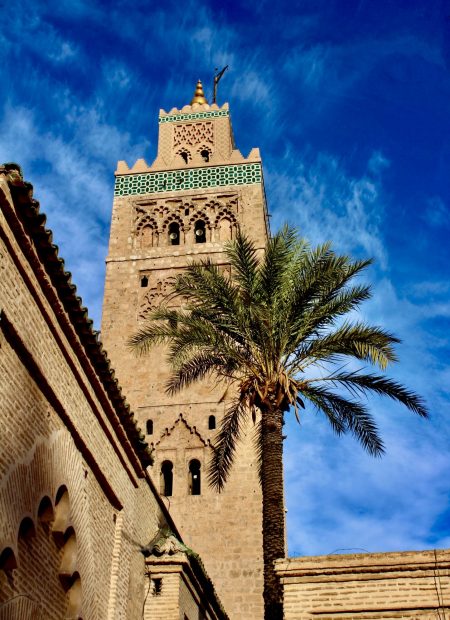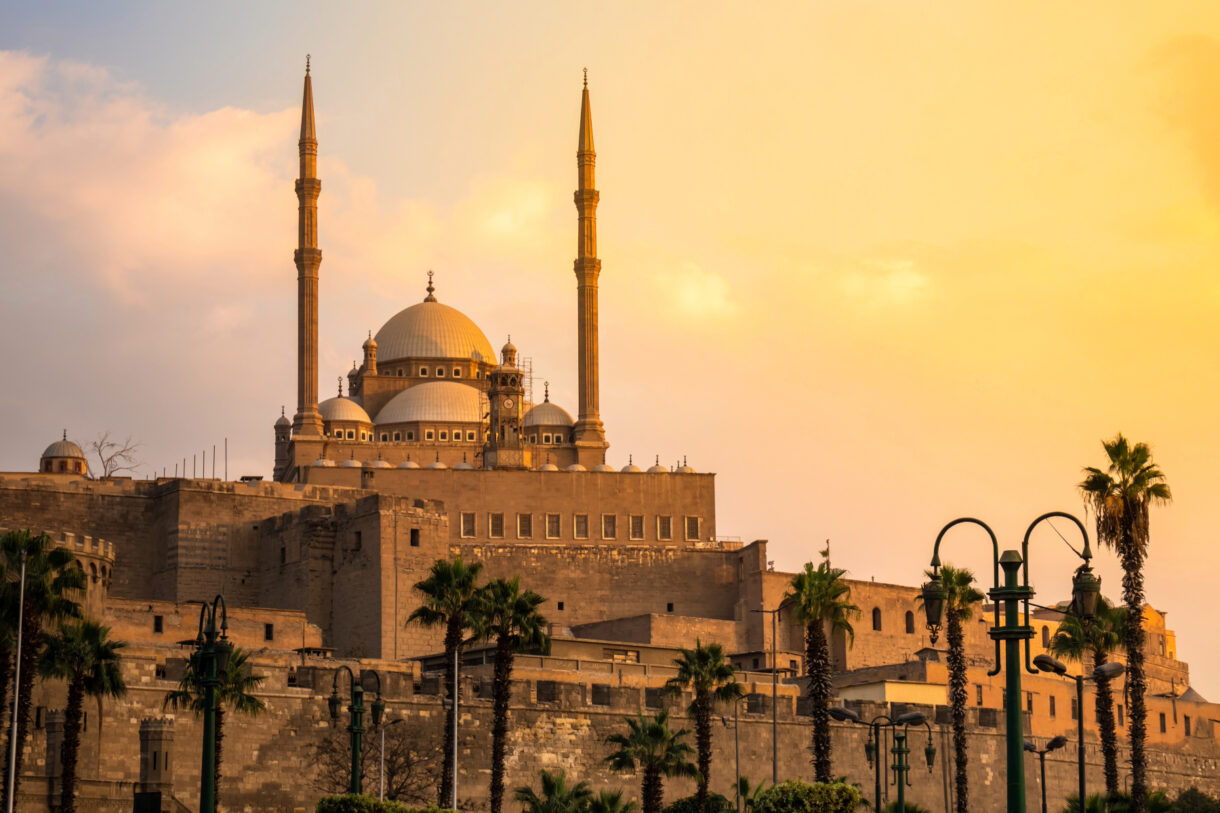
Travelling to Egypt during Ramadan: What to Expect?
One of my favourite things about travel is experiencing new cultures. And that’s why you shouldn’t shy away from travelling to Egypt during Ramadan!
This sacred period in the Islamic calendar brings about a noticeable change in the daily life and atmosphere of Egypt, offering visitors a chance to witness unique traditions and experience the warmth and hospitality of Egyptian culture.
So, should you visit Egypt during Ramadan? What should you expect when travelling to Egypt during Ramadan? How should you act? Keep reading as we answer all of these questions and more!
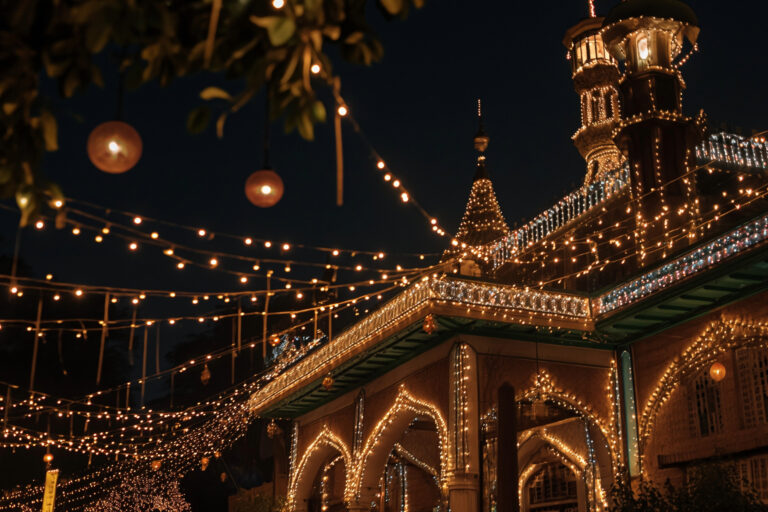
Mosques and buildings in Cairo lit up for the month of Ramadan
WHAT IS RAMADAN?
So, what exactly is Ramadan?
Ramadan, the ninth month of the Islamic lunar calendar, is a time of fasting, prayer, reflection, and community observed by Muslims worldwide. It forms one of the Five Pillars, the core beliefs and practices of Islam
Those who observe Ramadan refrain from eating or drinking anything, including water, between sunrise and sunset. Many also visit the mosque to pray more frequently and engage in charitable work or volunteering, such as distributing food to those in need and hosting community gatherings to pray and eat together.
The fast is broken every evening at sunset. Families and friends gather together for iftar, often starting with dates and water followed by a larger meal. During Ramadan in Egypt, sunset will be marked by the call to prayer echoing through the streets, as dates, sweets, and small puddings are shared around to break the fast.
Eid al-Fitr is the four-day celebration that signals the end of Ramadan. People celebrate with prayers, usually outside of the main mosques. This is followed by feasting, family time, and the exchange of gifts (usually money).
Note: The timing of Ramadan varies annually in line with the phases of the moon. This means that it isn’t always the same month every year. We didn’t realise that it was Ramadan until after we’d already booked our trip to Egypt. Don’t worry though, travelling to Egypt during Ramadan is an amazing experience and won’t limit your enjoyment.
WHAT TO EXPECT IF YOU'RE TRAVELLING TO EGYPT DURING RAMADAN
Ramadan in Egypt is similar to Ramadan around the world. Most Muslims will be fasting from dawn until sunset, partaking in more frequent prayers, and prioritising time with friends and family, especially in the evenings.
Although the afternoons may be sleepy, the atmosphere in the evenings is lively and spirited. Around sunset, streets bustle with activity as people rush home to break the fast with their families or head to the mosques for prayers.
Ramadan is a joyous time for everyone. And it’s not just limited to locals! Travellers can join in with the community spirit, as neighbourhoods come together to break the fast outside in the streets.
The air is filled with the aroma of traditional Egyptian food. And tourists aren’t exempt from the festivities. Walk through the streets of any Egyptian town or city and you’ll be handed dates and desserts, and invited to break the fast too as Egyptians embrace the spirit of charity and generosity.
But what does this mean for you, the traveller, when you travel to Egypt during Ramadan?
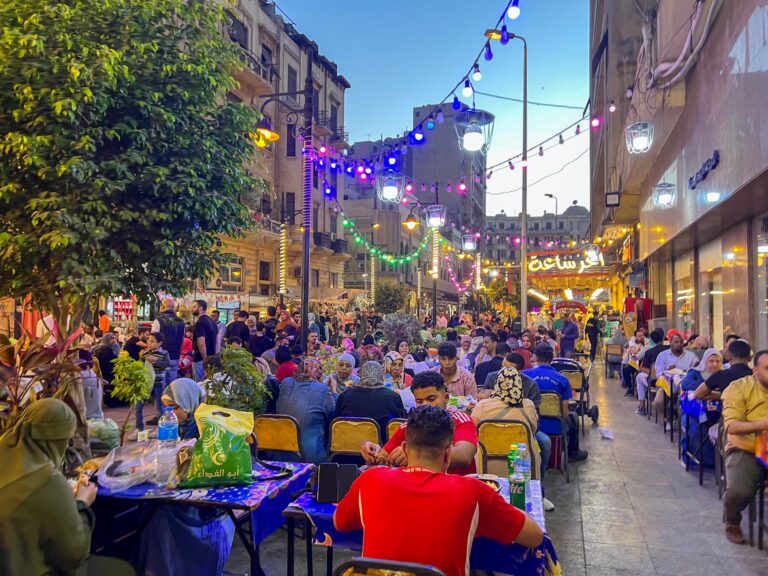
Breaking the fast at sunset in Cairo
HOW DOES RAMADAN AFFECT TRAVELLERS IN EGYPT?
Ramadan is a beautiful time to visit any Islamic country that observes this. Although the people of Egypt are known for being welcoming, there’s a warmth during Ramadan that’s hard not to love (and no, it’s not just the sun). However, when planning a trip to Egypt or during Ramadan, it’s important to anticipate a few adjustments to the typical tourist experience:
#1 ALTERED HOURS
Many shops and businesses operate on irregular hours during Ramadan and Google Maps will almost definitely not be correct! Restaurants and shops may be closed in the afternoon. And most places will be closed temporarily at sundown as everyone stops work to break the fast.
It can be a little frustrating when you plan lunch at a specific restaurant only to arrive and find it closed. Or, if you’re travelling in a rural area and there’s nothing open. But it’s worth it for the atmosphere in the evening, with a celebratory atmosphere on the streets and most businesses open late into the night.
Top tip: To avoid being hangry (so hungry it makes you angry and cranky), plan ahead and keep a few snacks in your backpack at all times. And always have a backup plan!
Oh, and tourist areas aren’t really affected by Ramadan. All of the Ancient Egyptian sites, museums, and popular shopping areas will be open as usual (yes, you can visit the Pyramids during Ramadan in Egypt). Restaurants and shops catering to tourists stay open for most of the day too. There’s a lot of competition in Egypt, and your custom is just too valuable an opportunity for an entrepreneur to pass up!
#2 SLEEPY AFTERNOONS
In the afternoon, especially in smaller towns, you may encounter a quieter atmosphere as locals take a break to rest. Most people who observe Ramadan will have been awake since before sunrise and business is slow in the afternoon, so many establishments close and the streets empty.
This is a good opportunity to slow down and appreciate the relaxed pace of life. Embrace it! Honestly, we were on such a whirlwind itinerary (yes, we did it to ourselves), that by the time it was 3pm, I was ready for a nap too.
Just adopt the siesta. Rise early, nap in the afternoon, and head out again to stay out late. It’l help you to beat the heat too!
#3 PEOPLE CAN BE SHORT-TEMPERED
When it gets to mid afternoon, you may notice the streets getting quieter. And those who remain at work, especially those in jobs catering to tourism, seem easily irritable. Touts may be more aggressive in pushing their agendas. Shopkeepers more liable to snap. And taxi or bus drivers may drive more recklessly, especially towards the sunset hours.
Try to have some patience and kindness. You’d probably be hungry and frustrated if you hadn’t had anything to eat or drink since 4am as well.
#4 FOOD AVAILABILITY
Finding food during daylight hours can be more challenging, as many restaurants and eateries are closed until iftar. However, it was easier to find food than we thought it would be. There are lots of restaurants in major cities and towns that cater to tourists and remain open to cater to non-fasting visitors.
If you’re heading to a more rural area, you might want to pack some snacks to avoid becoming uncomfortably hungry. Just make sure to eat them discreetly out of respect for those fasting.
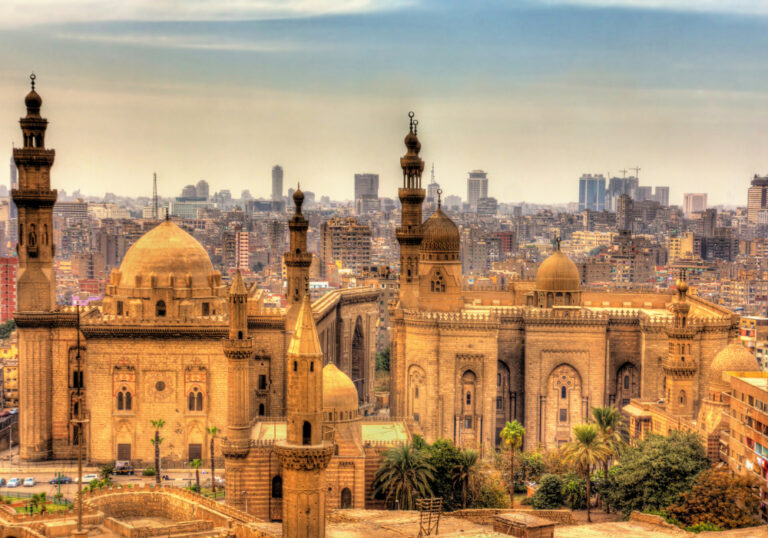
BUT THERE ARE SO MANY POSITIVES...
Honestly, these ‘issues’ weren’t a problem for us at all. It was worth the minor inconvenience to experience Egypt during Ramadan. Here are the things we liked the most about Ramadan in Egypt:
#1 SHARING THE SPIRIT OF RAMADAN
A key aspect of Ramadan is community, and the spirit of Ramadan really shines through as locals make an extra effort to be hospitable and kind.
People are more inclined to engage with visitors, share their traditions, and extend invitations for iftar. You’ll be invited to join many strangers to break the fast together, whether you’re Muslim or not. It’s a beautiful experience.
#2 THE EVENING ATMOSPHERE
Although the afternoons during Ramadan are a little slow and sleepy, the vibrant and sociable evening scene more than makes up for this.
Streets come alive with bustling markets and families gathering for iftar. If you’re in Cairo, the streets are flooded with locals breaking the fast and laughing together, and you’ll be welcomed if you choose to join in
Shops stay open late and most Egyptians stay out well into the night, chatting and enjoying the cool air. The atmosphere is joyful and welcoming, with a strong sense of community spirit. It’s hard to beat!
#3 EXPERIENCING A DIFFERENT CULTURE
Travelling to Egypt during Ramadan firsthand allows you to gain a deeper understanding of Islamic traditions and customs.
The call to prayer echoes across cities, perhaps even more than usual. You’ll almost definitely have the opportunity to join locals for iftar and share in the breaking of the fast. And, if you’re around for Eid al-Fitr, you’ll have the chance to join the feasting that occurs across all the cities.
IS EGYPT WORTH VISITING IN RAMADAN?
The short answer to the question: Yes!
Travelling to Egypt during Ramadan is an incredible experience and definitely worth it. The atmosphere in Ramadan is filled with community and celebration. You’ll be able to experience colourful street festivals and receive many invites to break the fast at iftar with happy strangers. Visiting Egypt during Ramadan will give you a better appreciation of Egyptian culture and traditions.
Most, if not all, of Egypt’s main attractions, such as the Great Pyramids of Giza, Luxor’s temples, and Cairo’s museums, mosques and madrassas, remain open to visitors during Ramadan. Plus, fewer crowds will let you explore the sites in a more relaxed atmosphere.
Whilst there may be some adjustments to consider, you might even find yourself grateful that everyone is away napping in the afternoon when it saves you from being harassed by shopkeepers and touts!
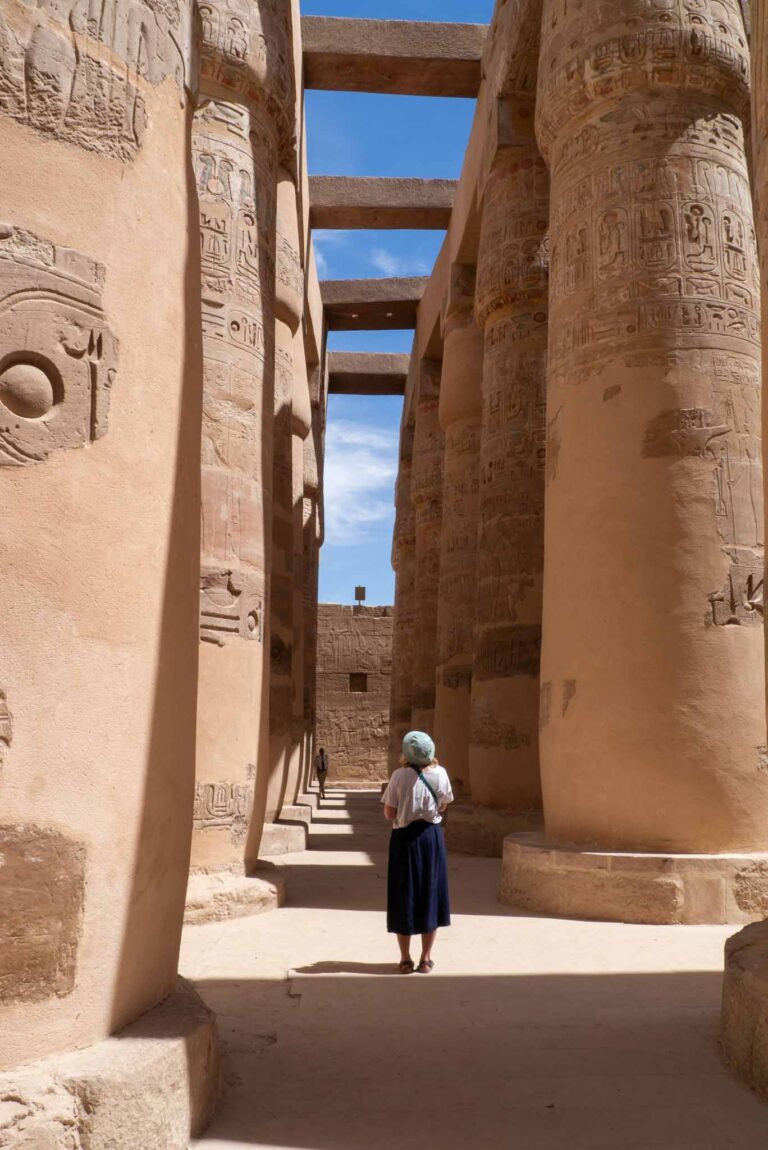
Don’t worry – all the must-see sites are still open!
TIPS FOR RESPECTFUL TRAVEL DURING RAMADAN
Here are our top tips to make the most of your trip to Egypt during Ramadan while being respectful of local customs:
#1 BE MINDFUL OF EATING IN PUBLIC
If you’re not Muslim, no one will get angry with you for eating and drinking in public. If you are Muslim, no one will get angry with you either! There are so many reasons why an individual might be unable to fast.
That said, if you do need to eat or drink, it’s polite to do so discreetly out of respect for those who are fasting. The one exception we saw was at major tourist sites, where no one seemed to care.
#2 PARTICIPATE RESPECTFULLY
Egypt is a relatively conservative country, and travellers should always dress appropriately and avoid public displays of affection etc. This is especially the case during Ramadan. And especially especially important if you are visiting religious sites.
If you are invited to participate, such as by joining locals for iftar, accept graciously and respectfully. Engage in conversation, show appreciation for the hospitality, and observe local customs.
#3 EMBRACE THE FESTIVE SPIRIT
Take part in the festive atmosphere by visiting night markets, attending cultural events, and exploring the cities after sunset. This is a unique opportunity to connect with the culture and community of Egypt.
FINAL THOUGHTS…
Travelling to Egypt or Morocco during Ramadan offers a glimpse into a deeply spiritual and communal aspect of Islamic culture. You might need to be more flexible, but the rewards of experiencing Ramadan far outweigh any minor inconveniences.
From the warm hospitality to the vibrant evenings, every moment during this sacred month adds a layer of authenticity and richness to your travel experience. So, if you’re travelling to Egypt during Ramadan, embrace it and celebrate the beauty of cultural diversity in this remarkable destination.
If my content helped you plan your next adventure, taught you something new, or simply made you smile, consider supporting the site! A small donation helps keep this blog going, fuels my creativity, and maybe even buys me a coffee along the way. Thank you for being here and being part of this journey! 😊
FAQs
Is it OK to travel to Egypt during Ramadan?
Yes! You’ll have an amazing time, the Egyptians are (for the most part) a welcoming and warm people. However, you should be mindful of local customs and respect the significance of Ramadan
Are shops open in Egypt during Ramadan?
Generally, shops and businesses will adjust their hours during Ramadan in Egypt, with some opening later in the morning and staying open later into the evening. It’s common for shops and markets to close temporarily around sunset to allow for the breaking of the fast (iftar). Shops catering to tourists may have more consistent hours
When is Ramadan in Egypt?
The dates for Ramadan change each year depending on the lunar calendar. You can find the start dates for Ramadan in Egypt here.
Can you visit the Pyramids during Ramadan?
Yes, you can visit the Pyramids during Ramadan. They’re open as usual. No one will mind if you need to eat or drink here, as the area mostly caters to tourists.
Can tourists drink alcohol in Egypt during Ramadan?
First of all, good luck finding any! The only place we found alcohol in Egypt during Ramadan was in a hotel bar, which clearly caters to tourists. That said, if you do find alcohol, it is not appropriate for tourists to drink in public, especially during Ramadan.
LIKE IT? PIN IT!
SAVE THIS POST TO YOUR PINTEREST BOARD TO COME BACK LATER
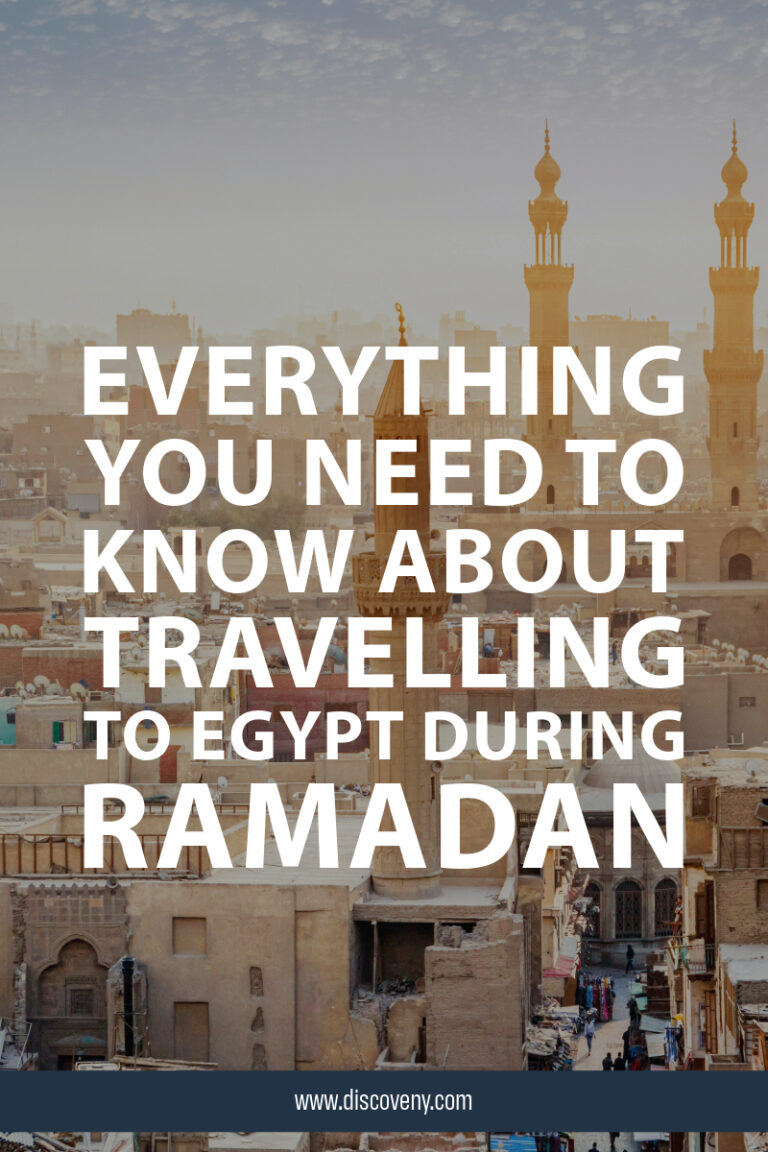
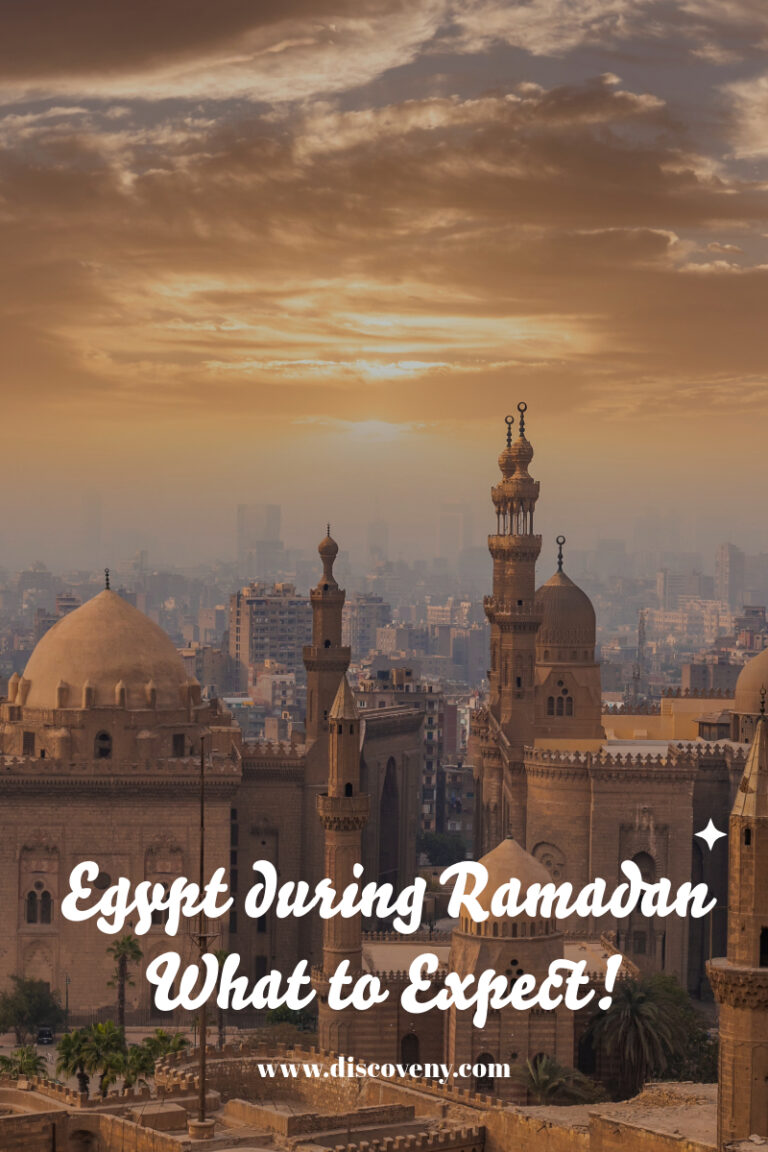
Follow our daily adventures on Facebook and Instagram
Disclaimer: The information and advice provided in this blog are the author’s opinions and based on their personal experiences. All information was accurate at the time of writing. However, things can change quickly, so always double-check current conditions and guidelines before setting out. Remember, your travels and safety are your own responsibility, and this blog can not be held responsible for anything that might happen on your adventures! Always exercise caution and good judgment. Oh, and don’t forget to get travel insurance! Happy travels!
This post may contain affiliate links (yay for transparency!) This means that I will earn a small commission, at no additional cost to you, if you click the link and choose to buy the product. I only link to stuff I have personally bought and found useful and never endorse crap. Your support helps keep the site going, thank you!
Alice
Alice is a UK travel blogger who advocates sustainable travel and being more eco-conscious on a budget. She loves coffee, her houseplants and summiting mountains.
You May Also Like
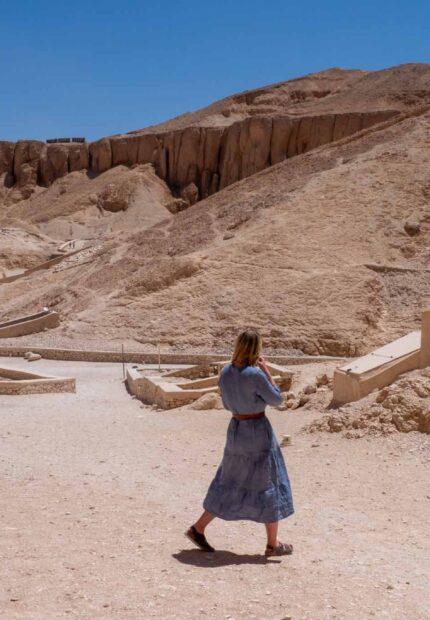
What do things cost in Egypt?
May 1, 2024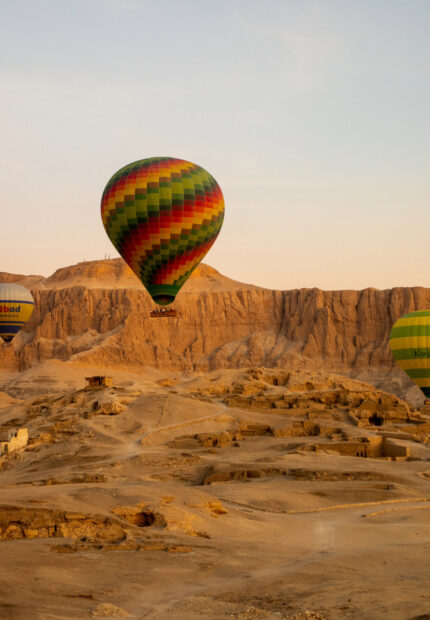
The ULTIMATE guide to Hot Air Ballooning in Luxor
July 20, 2024